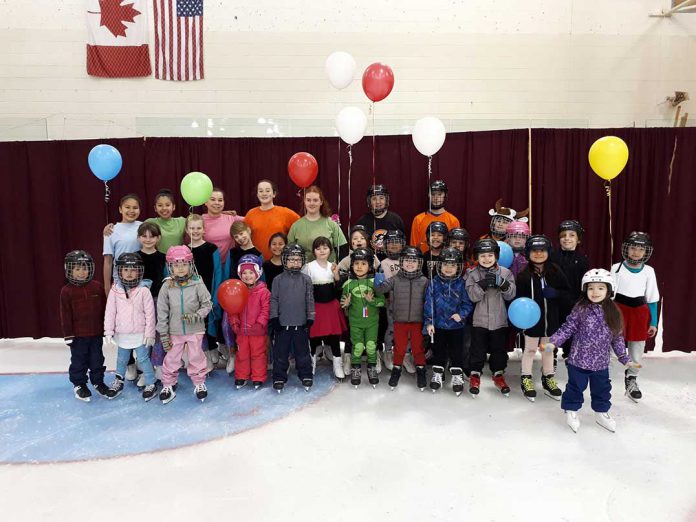Ruby Noble
Ruby Noble is a very charming lady, a Haweater, 90-years-old, who currently makes her home in the Mill Site Apartments in Gore Bay. She enjoys a terrific, unobstructed view of the North Channel where she is surrounded by cherished memories garnered from 80 years of living on Manitoulin. These include family furniture, photos of her beloved late husband, Lloyd, and other memorabilia. Ruby has endured a lot of sad milestones in her life, but she remains positive and enthusiastic.
“My dad’s family, the Robinsons, moved from Ogdensburg in New York State to Orillia when dad, Edward, was just a boy. He went north to Manitoulin as a young man, settling in the Bidwell area and marrying Ellen Ann McKay, whom he had met in a Northern Ontario store she was working in. He convinced her to return to Manitoulin. Ellen’s parents, Roderick and Hannah Martha (Hembruff) McKay, had started Bass Creek Resort on Lake Manitou.
“They lived in an impressive house with 14 bedrooms. Roderick was a good businessman. He always planned, carefully, each initiative he pursued. He realized driving the democrat to the ferry to pick up tourists would increase business and it did. Sadly, Grandfather Roderick died at 48 years, six months after he was kicked in the stomach by a horse.”
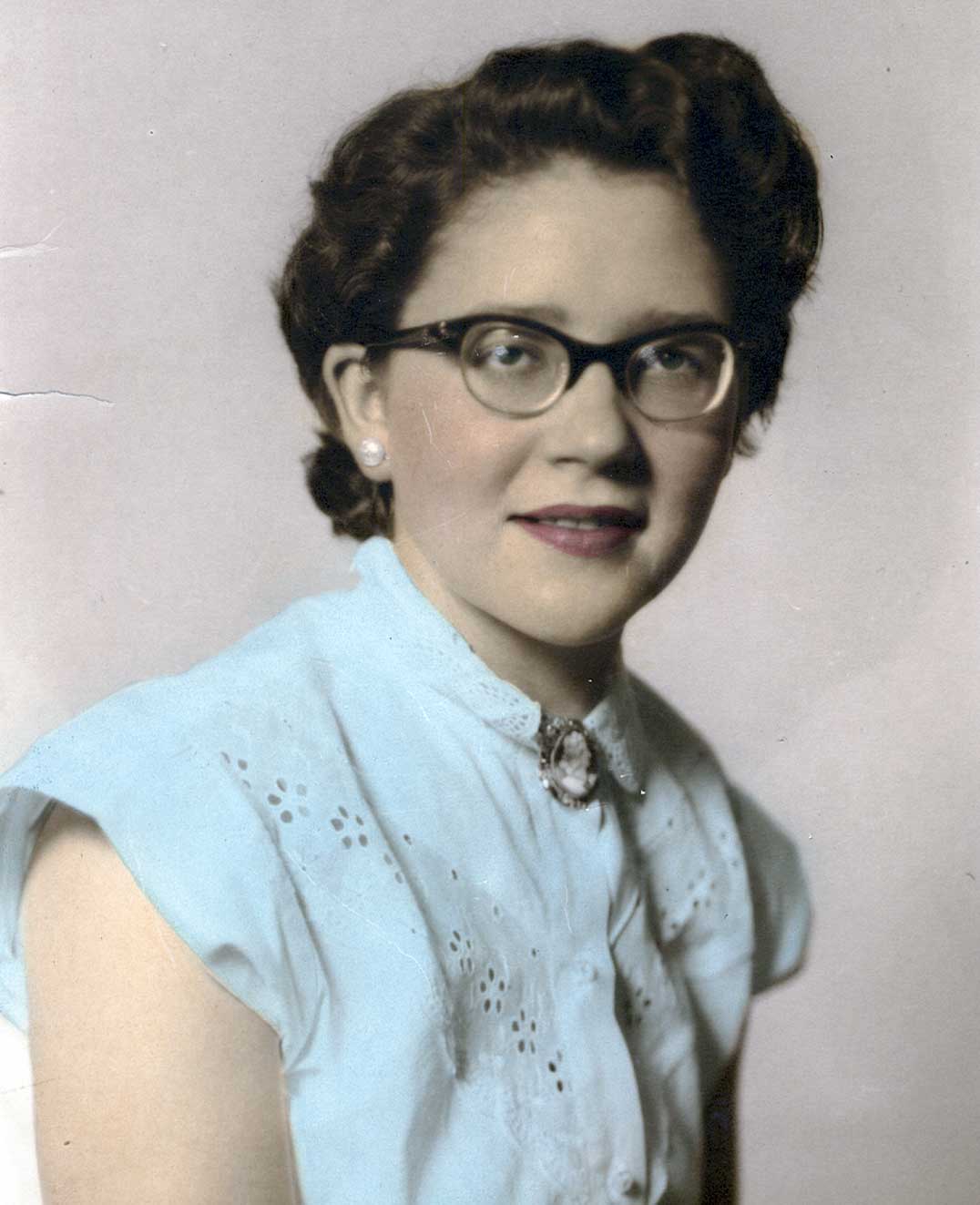
“Uncle Bill took over the resort after Roderick died. Bill and his Ella married the same day as my parents. Both couples were wed in Gore Bay. Ellen and Edward helped at the lodge. Mother Ellen ran the post office and she loved fast horses; the faster they ran, the better. She would jump into the democrat, her two-wheeled buggy, pulled by drivers, two light horses, and she would pick up tourists for the camp and all the mail for their area.” Anyone who might also take the horse out, got from her, “You be quick and ready to go when she is, or she will leave without you.” Her love of speed even encouraged her admiration for Elvis Presley because he ‘could really move.’
Ruby was Ellen and Edward Robinson’s third child and first girl, arriving on September 11, 1927 in Blind River. She would have two sisters and two brothers, Garnet, Seward, Vina and Freda. Dad Edward worked as a carpenter at the Hixon Mill and at the Blind River Lumber Yard. The family moved to where the jobs were and it was in Owen Sound where Edward found employment with the Owen Sound Furniture Factory. “We lived near the factory which sat right in town, on the river.” Ellen took in boarders and was able to manage five children and four boarders.
“We had chickens. One day in the hen house, our angry rooster, with his wings ‘flayed out’ making him look ferocious, attacked Vina and cut her mouth. Dad got so angry, he grabbed the rooster and cut his head off. Vina still has that scar from the rooster today.”
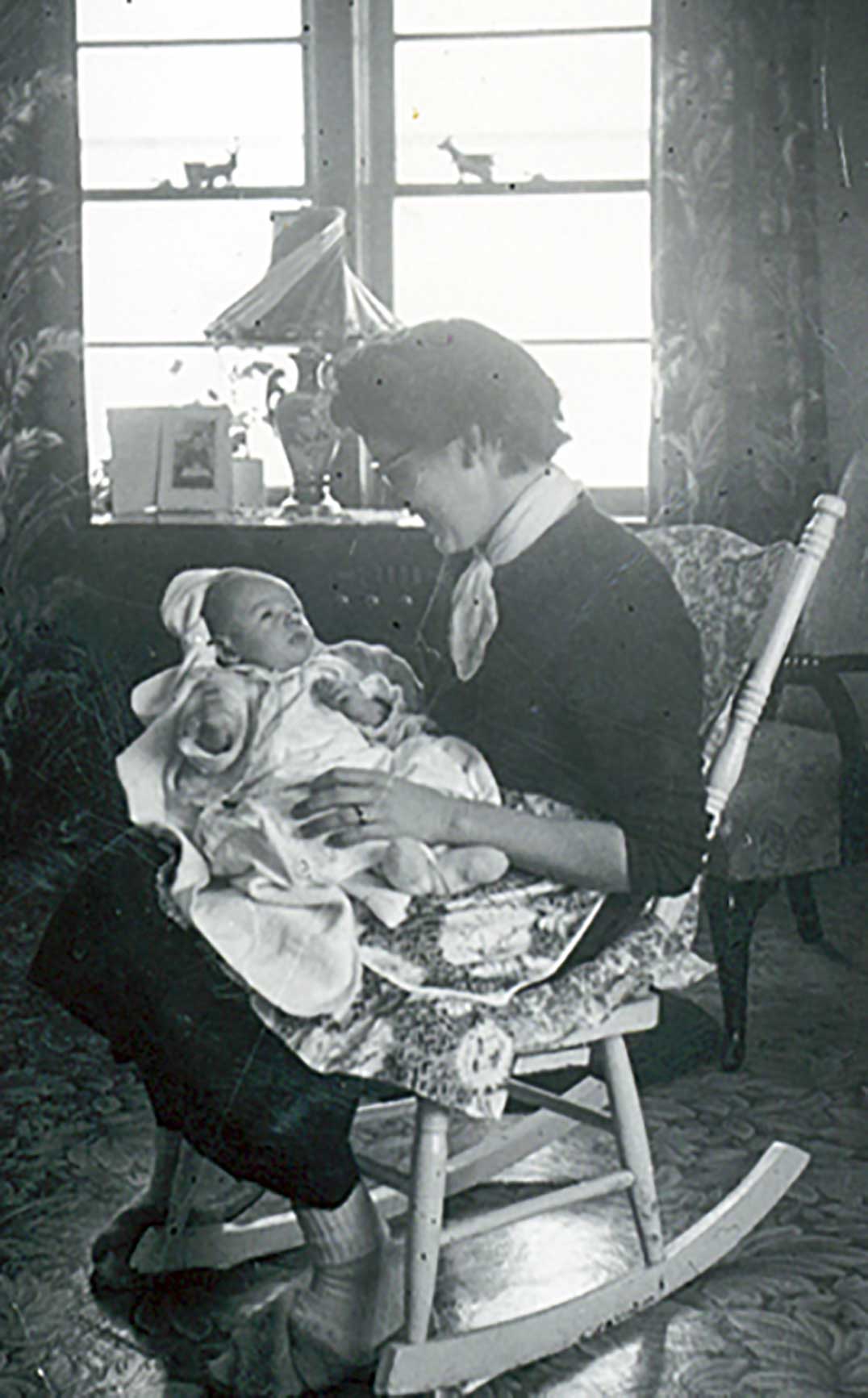
Brothers Seward and Garnet would take their wagon and pick up discarded wooden slabs at the furniture factory and pile them up at home. When the economy slumped in the 1930s, Edward and all the boarders lost their jobs. Ellen was forced to line up for relief services. She declared, “this is the first and last time I am going to ask for ‘relief’.” The family found a cousin who had a farm to rent. To get the funds for the initial rent, Ellen found a fellow with a trucking business. He was willing to pay for all the slabs of wood that the boys had saved, and the family moved.
The farm in Dornoch on Highway 6 in the Bruce Peninsula was next to the store and post office in town. “We found out later that the trucker we had sold the wood to had gone to desperate measures to stay solvent. He had set fire to a crib in his home in Owen Sound and then called the fireman. He was arrested and jailed. The Dirty 30s was a time of high stress for many.”
“Our first car was a Chevy with heavy canvas doors. They were adequate because cars were only used in the summer when no plowing was needed. Nevertheless, in the earlier part of the year, quilts were wonderful to keep us warm while driving. I remember picking up our new car and stopping at cousin Ernie’s for lunch. While there, I was attracted to a shiny round coin which wound up in my pocket. I was just five but when we got home, mother wanted to know where I got it. I told her and got a severe bawling out. I never took anything after that.”
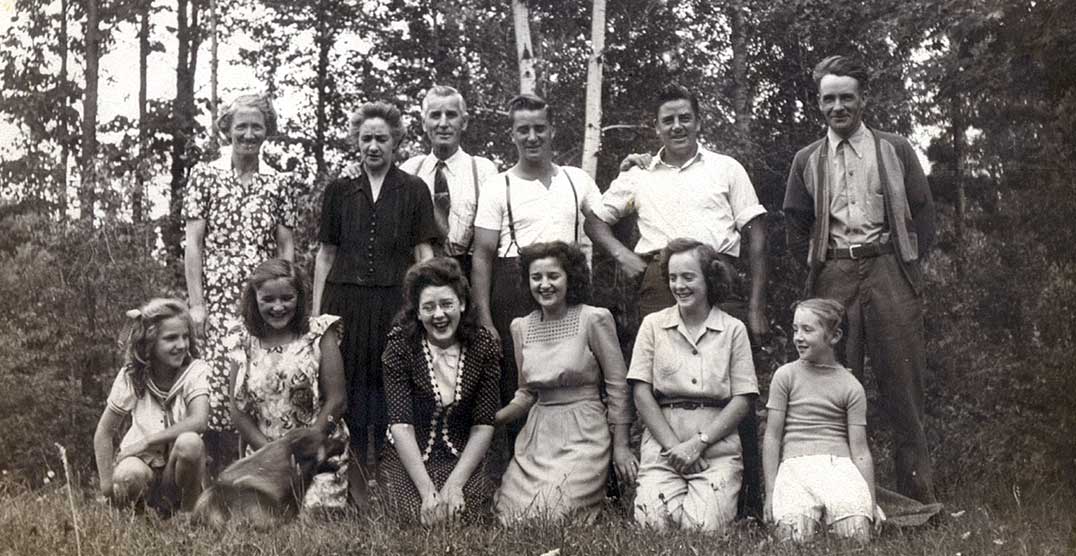
“There were lots of responsibilities on the farm and we all helped. I would often feed the animals and run after them if they were in the wrong field. It was a tiring job for a little kid.” Bidwell, back on the Manitoulin, was the first school. “I liked school. Favourite games were tag and hopscotch. At one point we had to take lessons by mail because we were four and a half miles away and the horses were busy on the farm. When we were a bit older we walked and picked up the mail at noon, another mile past the school.” A full day with getting the mail totalled 11 miles of walking.
“On the day named the shortest in the year, December 21, we ran to school and back home because we didn’t want to walk in the dark. Garnet had advised us to aim for four miles per hour. We got home in plenty of time, well ahead of the usual two hours, and realized that the change in daylight was not as extreme as we thought.”
Classes went up to Grade 10 at Hilly Grove Public School south of Manitowaning. “I would have stayed longer but circumstances did not allow for more schooling at that time. Distances were too great, and the family needed support.”
“One of my brothers, Seward, was quite shy and the other, Garnet, smart but mischievous. He just knew the answers and never had to think. Despite his naughtiness, he reached Grade 8 by the time he was 11. Mother would ask him to help us with our schoolwork, but he usually declined, saying, ‘just use your brains’.” The brothers worked on farms on Manitoulin for a while and left the Island to work in other locations.
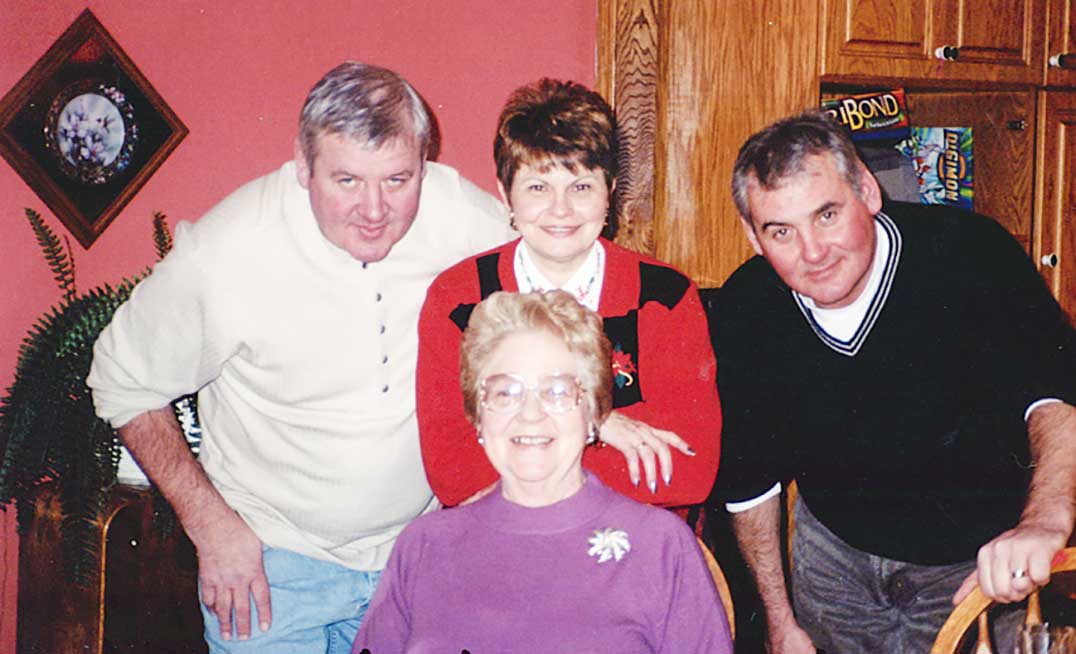
Garnet was asked to go to the States with a Mr. Bean who owned the Eagle’s Nest further south on the east side of Lake Manitou. Mr. Bean wanted to see him reach his full potential with more education, but the decision was made to keep him at home to help out. “I always wondered how his life might have turned out if he had taken that chance.” Eventually, both brothers tried to join the army, but Garnet was refused because he was diabetic. He died at age 49. Seward came back from the war, suffering with psychological damage, but lived to be 78.
Ruby worked at the Wee Point Lodge owned by cousin Reuben Hembruff at the time. She worked at Timberlane Camp at Silver Bay near Sandfield when she was 16. “I enjoyed working with the tourists. Sometimes I would pick up post cards to mail for the visitors. I was surprised to see one card sent out with the following message, ‘We are way up here in the wilds.’ I didn’t think of Manitoulin in that way.”
“Vesper and Lily McCutcheon, who ran Timberlane ,were great to work for. They had no kids, so needed more help. They always made sure we got all the tips. We slept in the farm house and got up at six in the morning to make breakfast. Ruby recalls one elderly lady who was up at six too, and declared, “I pretty well over-slept myself.” The staff thought that was funny coming from a guest who is on holidays and can’t sleep in.

Mr. McCutcheon wanted to know who went out on the boats one day, and we always referred to groups by their number. ‘What four went out?’ he asked one worker, who responded, ‘To fish of course.’ Everyone got a good chuckle.
Ruby also spent four years at Watson’s Store in Sandfield and, by 1951, was employed in Gore Bay at Smith’s Wholesale. “I worked there as a bookkeeper using all my experience from previous jobs.”
That year Ruby also met an interesting man, Lloyd Noble through Roy Arnold, who lived in Sandfield. Lloyd would visit the Arnolds. “Roy asked me if I would like to meet a nice young man who owns a store near Gore Bay.” Likewise, Lloyd was asked if he wanted to meet Ruby Robinson and Roy told Ruby that Lloyd had been asked. Ruby, a little miffed by all this arranging, declared, “Well, if he doesn’t have the gumption to come himself, he needn’t bother.”
Lloyd came by himself. Ruby knew that the Noble boys hosted movie nights in various Island locations. The grapevine had also shared that Lloyd was nice and he had been married before. His wife had died when their baby Beulah was born. The baby was being raised by her mother’s family in Sudbury.
Ruby and Lloyd tied the knot in Manitowaning with Reverend Harris officiating on Monday, May 4, 1953. About 900 people gathered in the community hall in Mindemoya. “We sure didn’t expect that many would come and I’m sure we ran out of food.” In December of that year, the new store (at the Noble Sideroad intersection in Gordon/Barrie Island), called Lloyd’s Grocery, was ready, and the young couple began to sell groceries and soon after, lumber.
In time, seven-year-old Beulah came to Manitoulin to live with her dad’s new family. She arrived with a bowl haircut and had been lovingly indulged by her maternal grandparents. “There were a few set-tos. Her favourite expression was ‘twelve and twelve is 24, shut your mouth, and say no more’ just before she slammed the door to her room.” She was offered lessons on the piano, but she decided she didn’t want to play.
Reading was a bit of a challenge for Beulah at first. If she came to a word she couldn’t get, she would start over. One day Ruby was teasing her to try harder and it seemed to work because she challenged the difficult words after that. “In time she came to accept us, and we became a happy family. Son Mike was added to the family and later twins Pat and Patricia were born but Patricia died at birth. “I developed toxemia with their arrival, but in time, it healed.”
“Pat was a little frail at first, but he grew strong. He liked to skate and play hockey and he loved his pet dog, even sharing ice cream with him. He also enjoyed hunting. Later, when Pat shot a moose near Webbwood, dressed it and hauled it out of the bush for two miles, he decided that hunting was not for him.”
“The neighbours’ kids used to call me ‘Ibby’ because they had trouble saying Ruby. Raising our kids was a good experience for Lloyd and me. We enjoyed the time with them. If I spoke cross to one of them, they would do as they were told. I know they also did things they never told me about and sometimes I think it was good that I didn’t know at the time.”
All three children worked in the store next to the family home. Their home had 16 rooms, six of which were bedrooms. It was a grand house to live in. The family was too busy to do a lot of travelling. “We went west one year, going by train from Sudbury to Edmonton, and then taking a bus to the coast. I didn’t like the mountains, they were so high, they scared me a little. The roads in the valleys were more treacherous too. In Vancouver we met a friend who toured us around so we could see the city. We were supposed to meet our niece too but couldn’t locate her and didn’t have her contact information. She never forgave us for missing the connection.”
After both parents died, Uncle Bill took over the farm. Another sad incident that marks the milestones of Ruby’s life was the death of her beloved Uncle Bill. “By 1947, Bill’s wife Ella was having a real hard time with the ‘change of life.’ Bill tried to help her as much as he could, but her health did not improve. One day Bill didn’t get her up. In her confused state, she must have thought him a burglar and shot him. Then she walked out of the house. She was incarcerated in an Ontario hospital at Penetanguishene. It was a hard time for the whole family because Bill had been loved by all.
“My mother suffered two strokes in later years and fought fiercely to restore her health but was beset with cancer and died at age 67.” Sadly, son Pat died a year ago. He had been a hard worker all his life, running Noble Lumber for 43 years and making a real success of the store.”
“Pat has a beautiful tombstone, beside dad in Gordon Township. Pat’s stone has his history on the back and his #16 hockey jersey. He had four kids, twins Kurtis and Kyle and two daughters, Dawn who teaches at MSS and Sara, a public health nurse. The boys run the store today and they are also building seniors’ units in Gore Bay and Little Current. They recently built two double units in Little Current, on empty lots they bought from Doug Smith. All the units are spoken for.”
Beulah (Hester) lives just around the corner. She has two boys, Chad and Clay and a daughter Lorraine. Chad works for McLean Engineering in Sudbury now. Clay works for Weatherford Oil overseas. Lorraine is Manitoulin’s ‘Dental Queen.’ Unfortunately, Beulah lost her husband, Brian not too long ago.
Son Mike lives in Sudbury with his wife Elaine. He has a son Ryan and a daughter Erin. Ryan is the executive director of the North York Harvest Food Bank in Toronto and Erin teaches high school in Sudbury. Mike used to drive horses he raised and trained at the Sudbury Downs. He won a $400 race in June of 1976 driving a horse-pulled sulky. They had all been surprised because the winning horse, Ava Java, was small and normally didn’t run in a straight line.
Lloyd and Ruby retired about 20 years ago. In 2002, Ruby was awarded ‘Citizen of the Year,’ complete with plaque presented by then MP Brent St. Denis. “I had volunteered for 20 years for the Cancer Society and sold a lot of fundraising tickets for Heart and Stroke. As I was getting older and less mobile, Beulah decided it was in my best interests to slow down. When a call came to see if I would go again, she answered the phone and advised them that ‘she has done it long enough. It’s time for her to retire’.”
“I like the warmer weather the most, maybe because I didn’t ski, or skate and the growing season was so important. There seems to be a change in how the seasons arrive these days. One season kind of blends in with the next. When it comes to television, I enjoy watching the Blue Jays, but I watch hockey too.”
“My strengths? I like to cook and bake buns, bread and pies. When we had the store, I would be up at five to sell baked items to the people coming in to the store at eight. Until recently, I was still baking for local charity sales. Telling stories is fun too, especially the good ones. I stay in touch with most things that are really important to me, like family and friends. I have nine grandchildren and 15 great-grandchildren, all good kids and funny too.”
“The doctors here look after us pretty good. Ten years ago I had some back trouble. Dr. Snider looked at my back and within two days I was on the operating table. When I asked about my quick surgery he said that ‘high priorities always come first.’ At this point, I don’t have more to worry about than a drop-foot. I am happy.”
“My recipe for happiness,” she chuckles, “I try to see the positive side of life. I also recommend that one tries to keep harmony with family. Independence is important too. If you ask someone to help and then something happens to them, you would feel bad, so I try not to do that. When the doctor asked me to come in for some bloodwork and there was a lot of snow on the ground, I politely declined, not wanting to get hurt or have someone else get hurt. Luckily, this doctor came to see me.”
“There really is no comparison with any place when it comes to Manitoulin. It’s quieter and much more peaceful here. People are always friendly, and some of us like to call ourselves Haweaters. I wouldn’t really want to live anyplace else. I would still take a train ride to go anywhere; I love the trains, even at 90. I would always come back here, where my family, friends and neighbours would be waiting for me. I am thankful for that.”


